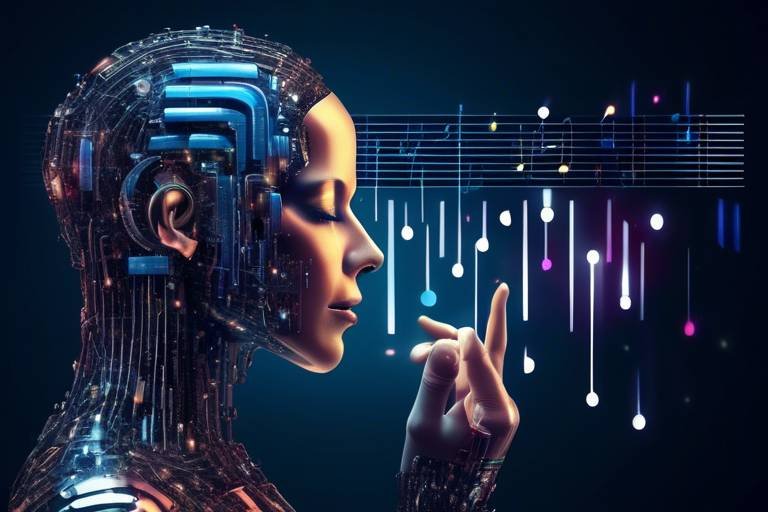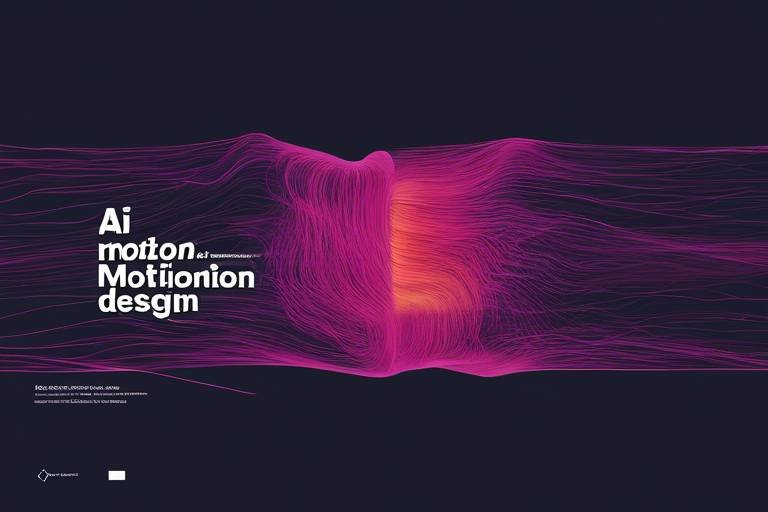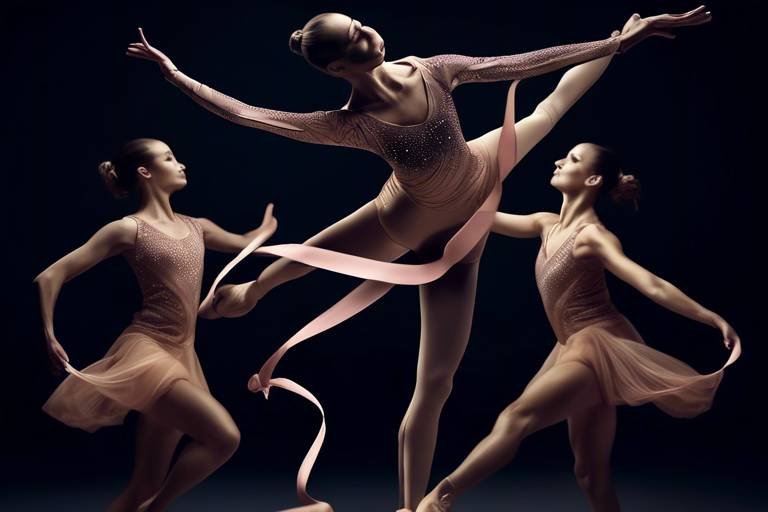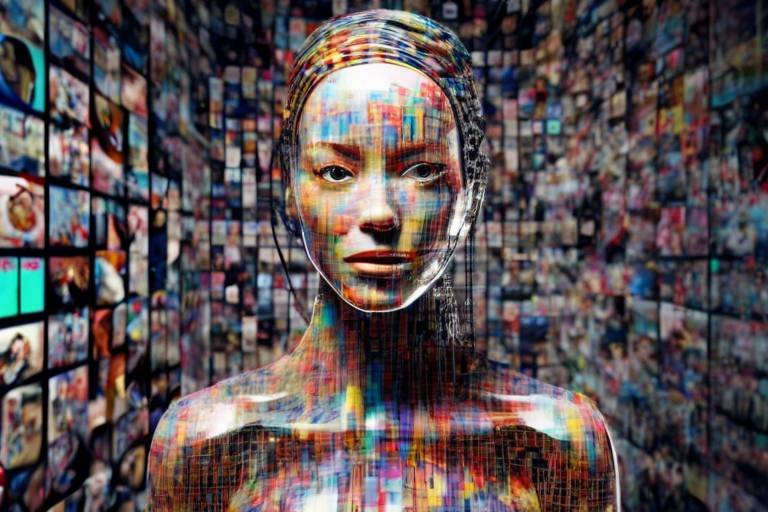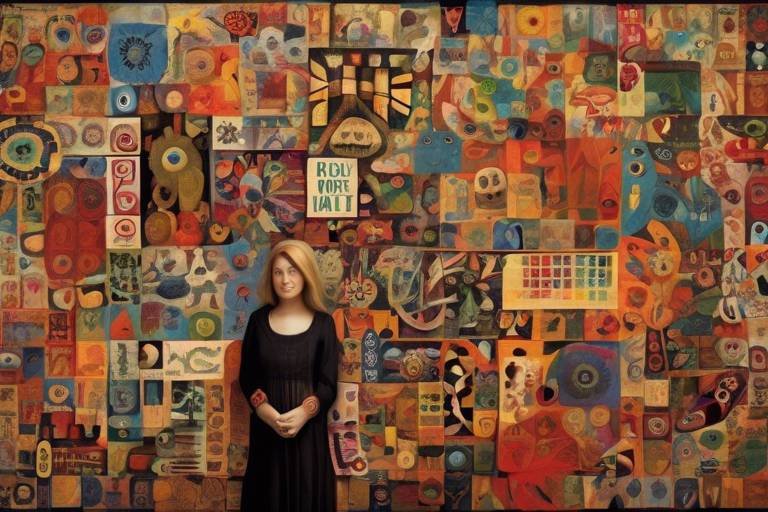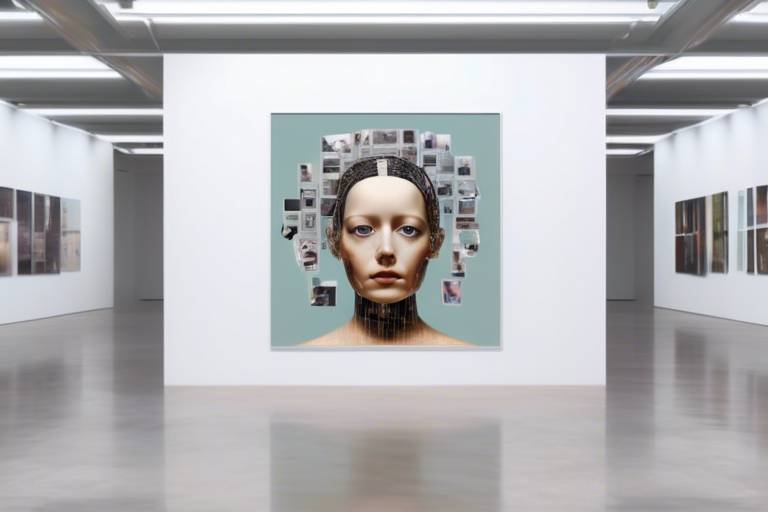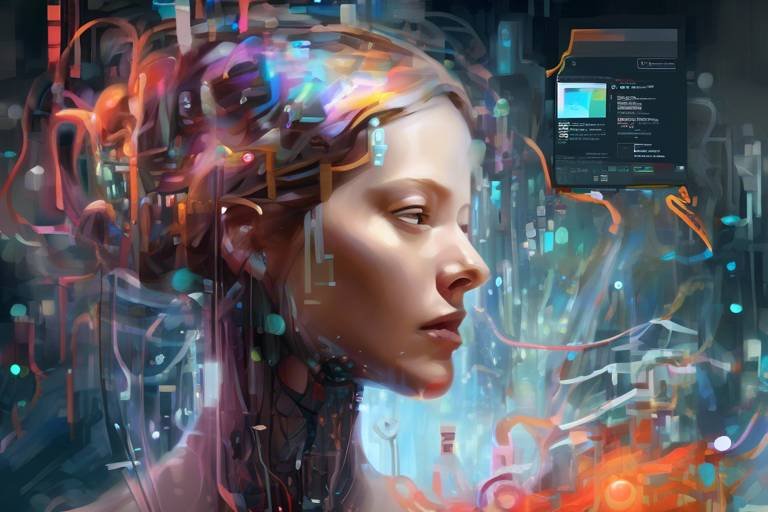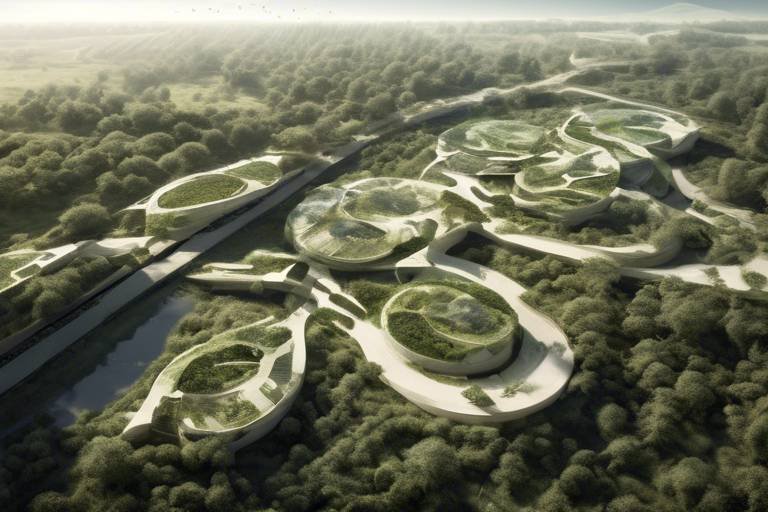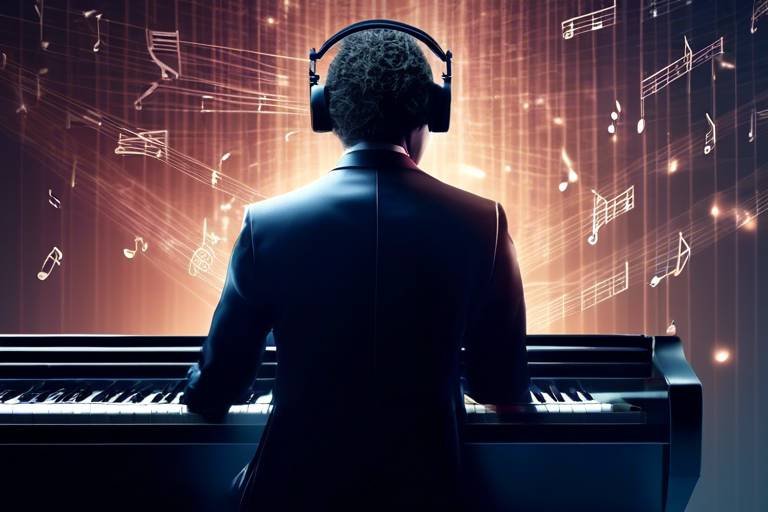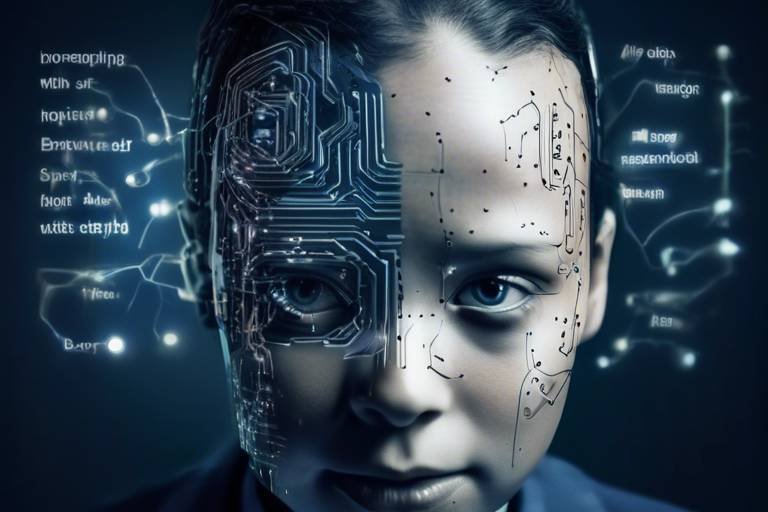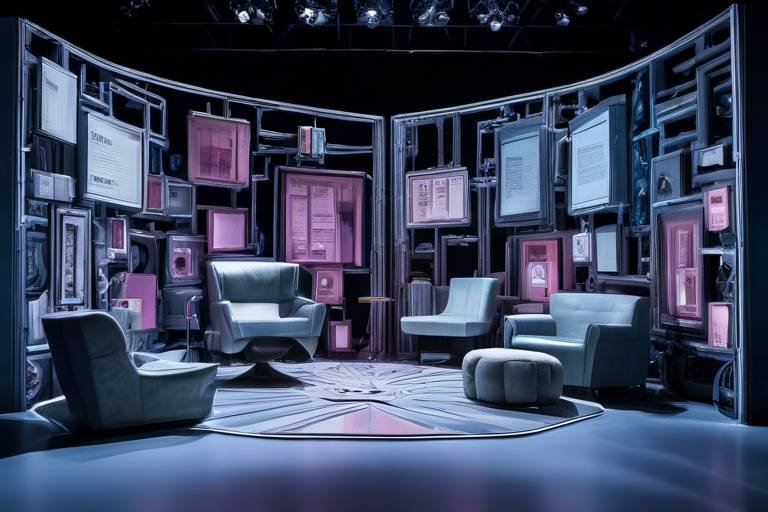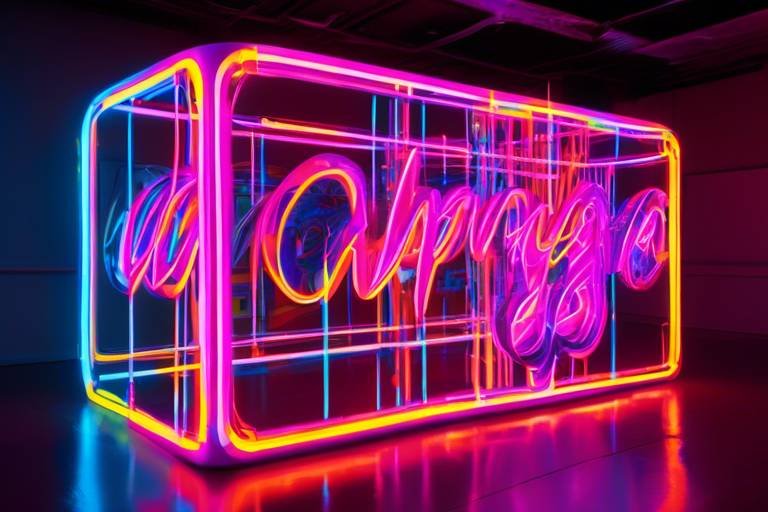Creative Prowess of Artificial Intelligence in Music
In the grand tapestry of human creativity, music has always held a special place. It's the universal language that transcends borders, cultures, and even time. But what happens when we introduce a new player into this age-old game? Enter artificial intelligence, a technological marvel that is not just a tool but a collaborator in the artistic process. The creative prowess of AI in music is nothing short of fascinating, as it reshapes how we compose, perform, and experience sound.
Imagine a world where machines can not only analyze music but also generate original compositions that resonate with human emotions. This is not science fiction; it's happening right now! AI algorithms are being trained on vast databases of music, learning the nuances of different genres, styles, and even the emotional undertones of melodies. This capability allows AI to create music that can evoke feelings similar to those stirred by human composers. The result? A rich, diverse soundscape that pushes the boundaries of what we consider music.
From classical symphonies to modern pop hits, AI is making its mark across various genres. For instance, consider the way AI can analyze patterns in a Beethoven sonata and then apply similar structures to create a new piece that could stand alongside the classics. This blend of technology and artistry is not just a novelty; it’s a profound shift in how we perceive creativity itself. Are we ready to embrace a future where the lines between human and machine-made music blur?
As we delve deeper into the realm of AI in music, we find that it’s not merely about replacing musicians but enhancing their creativity. AI can handle the tedious aspects of composition, allowing artists to focus on their emotional expression and unique perspectives. This partnership opens up exciting possibilities, as musicians can experiment with sounds and styles they might not have otherwise explored.
However, this evolution comes with its own set of challenges. The integration of AI in music raises important questions about authorship, originality, and the very essence of creativity. Is a song created by an AI truly original, or is it merely a remix of existing works? As we navigate this new landscape, we must consider the ethical implications and the future of artistic expression.
In summary, the creative prowess of artificial intelligence in music is a double-edged sword. It offers unprecedented opportunities for innovation and collaboration but also prompts us to rethink our definitions of creativity and authorship. As we continue to explore this fascinating intersection of technology and art, one thing is clear: the future of music is not just in the hands of humans anymore; it’s a shared journey with our AI counterparts.
- Can AI really create original music?
Yes, AI can analyze existing music and generate new compositions that can be considered original, although the debate about authorship continues. - How is AI used in live performances?
AI technologies enhance live performances by creating interactive experiences, such as real-time visualizations or adaptive soundscapes that respond to the audience. - What are the ethical concerns surrounding AI in music?
Concerns include issues of copyright, the potential loss of jobs for musicians, and the question of whether AI-generated music can be considered truly creative.

AI in Music Composition
Artificial intelligence is revolutionizing the way music is composed, marking a significant shift in the creative landscape. Imagine a world where machines can not only analyze existing music but also create entirely new compositions that resonate with human emotions. This is no longer a distant fantasy; it's happening right now! AI algorithms, powered by machine learning, are being utilized to generate original pieces across various genres, from classical symphonies to contemporary pop hits. The ability of AI to process vast amounts of musical data allows it to recognize patterns, styles, and even emotional cues, leading to compositions that can surprise and delight listeners.
One of the most fascinating aspects of AI in music composition is its capacity to collaborate with human musicians. For instance, AI can analyze an artist's previous works, understand their unique style, and then suggest new melodies or harmonies that fit within that framework. This creates a dynamic interplay where human creativity meets machine efficiency. In fact, many artists are now using AI as a tool to break through creative blocks, sparking new ideas and directions that they might not have considered otherwise.
Moreover, AI's role in music composition is not limited to just generating melodies. It can also assist in arranging songs, suggesting instrumentation, and even mastering tracks. For example, platforms like Amper Music and AIVA allow users to create custom soundtracks by simply inputting parameters such as mood, genre, and tempo. The AI then composes a piece tailored to those specifications, making music creation accessible to individuals with little to no musical training. This democratization of music composition opens up a world of possibilities, allowing anyone with a passion for music to express themselves creatively.
As we delve deeper into the world of AI in music, it's important to consider the implications of this technology. While the potential for innovation is exciting, it raises questions about the authenticity of music and the role of the artist. Can a composition created by an algorithm truly evoke the same emotional response as one crafted by a human hand? Or does the fusion of human and machine creativity lead to a new form of artistic expression altogether? These questions challenge our traditional notions of authorship and creativity, pushing the boundaries of what music can be.
In summary, AI is not just a tool for creating music; it is a transformative force that is reshaping the entire music composition landscape. As technology continues to evolve, we can expect to see even more sophisticated AI systems that will further enhance the creative process. The future of music composition is bright, and with AI at the helm, the possibilities are endless!

Collaborations Between AI and Musicians
In recent years, the partnership between artificial intelligence and human musicians has blossomed into a fascinating realm of creativity. This collaboration is not just a passing trend; it's a revolutionary movement that is reshaping how we perceive and create music. Imagine a world where a computer can not only assist in the music-making process but also inspire artists to explore uncharted territories of sound. This synergy between man and machine opens up a treasure trove of possibilities, allowing musicians to push the boundaries of their artistic expression.
One of the most exciting aspects of these collaborations is the ability of AI to analyze vast amounts of musical data. By doing so, it can identify patterns, styles, and trends that might elude even the most seasoned composers. For instance, AI can analyze thousands of songs across genres, distilling the essence of what makes a hit. This information can then be used by musicians to craft songs that resonate with audiences on a deeper level. It’s like having a musical crystal ball that offers insights into what listeners crave!
Moreover, the creative process is becoming increasingly interactive. Musicians can now collaborate with AI systems that suggest melodies, harmonies, and even lyrics. This partnership can lead to a more dynamic and engaging songwriting experience. For example, Amper Music allows artists to create music by simply inputting their preferences and letting the AI generate compositions. It’s akin to having a musical partner who never tires and can produce fresh ideas at the drop of a hat!
Let’s take a look at some notable collaborations that highlight this exciting trend:
- Taryn Southern - An artist who released an entire album called "I AM AI," where she collaborated with AI to create unique tracks that blend her vocals with machine-generated compositions.
- Holly Herndon - Known for her innovative use of AI in her music, she created a vocal synthesizer named Spawn, which learns from her voice and allows for new, experimental sounds.
- OpenAI's Jukedeck - This platform enables users to create custom music tracks using AI, making it accessible for anyone to produce high-quality music.
These collaborations are not just limited to the studio; they are also making waves in live performances. Imagine attending a concert where the music is dynamically generated in real-time, responding to the audience's energy and reactions. This is the future that AI promises, creating an immersive experience that blurs the lines between performer and audience. With AI, artists can create soundscapes that are as unique as each performance, ensuring that no two concerts are ever the same.
However, as we embrace this innovative partnership, it’s essential to consider the implications it brings. Questions around authorship, creativity, and the role of human touch in music arise. Are we losing the essence of what makes music a deeply human experience? Or are we simply evolving into a new era of musical expression? These are questions that the industry must grapple with as AI continues to play a significant role in music creation.
In conclusion, the collaborations between AI and musicians are not just a gimmick; they represent a profound shift in the musical landscape. As technology continues to advance, we can expect to see even more innovative partnerships that challenge our understanding of creativity and artistry. The future of music is here, and it’s a thrilling journey that combines the best of both worlds—human emotion and artificial intelligence.

Case Studies of Successful Collaborations
The intersection of artificial intelligence and music has given rise to some truly fascinating collaborations that not only push the boundaries of creativity but also challenge our understanding of artistry. One of the most notable examples is the partnership between the renowned electronic musician Holly Herndon and her AI creation, Spawn. Herndon has utilized this AI to generate vocal samples that blend seamlessly with her own voice, creating a unique soundscape that is both human and machine. This collaboration exemplifies how AI can augment artistic expression, allowing musicians to explore new sonic territories that were once unimaginable.
Another compelling case is the work of OpenAI with their music-generating model, Jukedeck. This platform allows users to create customized music tracks by simply inputting parameters like mood, genre, and tempo. The results have been astonishing, with many users reporting that the AI-generated music exceeds their expectations. Artists have begun to incorporate Jukedeck's compositions into their projects, demonstrating the practical applications of AI in music production. The ease of use and versatility of this AI tool has made it a favorite among independent creators looking to add a professional touch to their work without the need for extensive resources.
Moreover, we can't overlook the collaboration between the British band Coldplay and AI technology in their song "Everyday Life". In this project, the band experimented with AI-generated melodies and rhythms, merging them with their signature sound. The result was a rich, layered composition that showcased the potential of AI to inspire human musicians. This partnership not only resulted in a hit but also sparked conversations about the evolving role of AI in the creative process.
As we delve deeper into these collaborations, it becomes clear that the relationship between AI and musicians is not merely about replacing human creativity but rather enhancing it. By leveraging AI's capabilities, artists can explore new dimensions of their work, leading to innovative outcomes. The synergy between technology and human emotion creates a dynamic where both entities learn from each other, pushing the envelope of what is possible in music creation.
In summary, these case studies illustrate the profound impact of AI on music collaboration. The fusion of human creativity with AI technology opens up a world of possibilities, inviting artists to experiment and innovate. As we continue to witness these groundbreaking partnerships, it's exciting to imagine what the future holds for the music industry and the artists within it.
- What is the role of AI in music composition?
AI assists in generating melodies, harmonies, and even entire compositions, enabling artists to explore new creative avenues. - Can AI replace human musicians?
While AI can create music, it is not a replacement for human musicians. Instead, it serves as a tool that enhances creativity and collaboration. - What are some examples of AI in music?
Notable examples include collaborations with artists like Holly Herndon and platforms like Jukedeck that allow for custom music creation. - How does AI influence live performances?
AI technologies can enhance live shows with interactive elements, visual effects, and real-time music generation, creating immersive experiences for audiences.

AI-Generated Hits
In recent years, the music industry has witnessed a fascinating shift with the emergence of . These songs, crafted by algorithms and machine learning models, have not only made a significant impact on charts but have also started to challenge the traditional notions of creativity and authorship. Imagine a world where a computer can compose a melody that resonates with millions, tapping into the emotional depths of listeners just like a seasoned musician. It's not just a dream anymore; it's happening right now!
One of the most striking examples of AI's capabilities is the song "Daddy's Car", created by an AI system called Flow Machines. This track, inspired by the style of The Beatles, showcases how AI can analyze vast amounts of musical data, understand patterns, and generate compositions that are not only catchy but also commercially viable. The song was met with intrigue and applause, proving that AI can indeed produce music that appeals to the masses.
Moreover, AI-generated songs have started to gain traction on popular streaming platforms. For instance, tracks like "Blue Jeans" by the AI artist Yona have garnered millions of streams, illustrating that listeners are not just curious but are also embracing these innovations. The success of these AI-generated hits raises an important question: are we ready to accept AI as a legitimate creator in the music industry?
As we delve deeper into the phenomenon of AI-generated music, we must consider the implications of this technology on the creative landscape. Here are some key points to ponder:
- Commercial Success: AI-generated songs are not just experimental; they are becoming chart-toppers, proving their market viability.
- New Genres: The creativity of AI is leading to the emergence of entirely new genres, blending styles in ways that human musicians may not have envisioned.
- Collaborative Potential: Artists are increasingly collaborating with AI to enhance their creative processes, leading to unique fusions of human emotion and machine precision.
However, the rise of AI-generated hits does come with its challenges. Questions around authorship, copyright, and the essence of creativity are more pertinent than ever. If a song is created by an algorithm, who holds the rights? Is it the programmer, the company, or the AI itself? These are complex issues that the industry will need to address as AI continues to evolve.
In conclusion, AI-generated hits are not just a passing fad; they represent a significant evolution in the music industry. As technology advances, we can expect even more innovative compositions that could redefine what it means to be a musician. The collaboration between human creativity and artificial intelligence may lead us to a future where the boundaries of music are continuously pushed, creating a rich tapestry of sound that reflects the best of both worlds.
Q1: Can AI really create music that resonates emotionally with listeners?
A1: Yes, AI can analyze emotional patterns in music and generate compositions that evoke similar feelings, making it capable of resonating with audiences.
Q2: Are AI-generated songs eligible for awards and recognition?
A2: This is a gray area currently under discussion in the industry, with ongoing debates about authorship and creativity.
Q3: How do musicians feel about AI in music creation?
A3: Reactions vary; some view AI as a tool to enhance creativity, while others fear it might undermine traditional artistry.
Q4: What impact does AI have on music genres?
A4: AI is leading to the creation of new genres by blending existing styles in innovative ways, expanding the musical landscape.

Impact on Live Performances
The integration of artificial intelligence in live performances is nothing short of a revolution. Imagine walking into a concert where the music is not only played but also dynamically altered in real-time based on the audience's reactions. This is no longer a far-fetched dream; it's happening right now! AI technologies are enhancing the concert experience, making it more interactive and immersive than ever before. From virtual reality environments to AI-generated visuals that sync with the music, the possibilities are endless.
One of the most exciting aspects of AI in live performances is its ability to analyze audience engagement. For instance, AI systems can monitor crowd reactions—cheering, dancing, or even silence—and adjust the performance accordingly. This means that artists can tailor their setlists on the fly, creating a unique experience for each audience. It's like having a musical conversation where the artist and the audience communicate through sound and emotion, resulting in a truly unforgettable night.
Moreover, AI can assist in the technical aspects of live performances. Imagine a lighting system that changes color and intensity based on the rhythm of the music or a sound system that optimizes acoustics in real-time to suit the venue. These innovations not only enhance the aesthetics of the show but also ensure that every note is delivered with clarity and precision. In the table below, we can see some of the key technologies that are shaping the future of live music:
| Technology | Description |
|---|---|
| AI-Driven Visuals | Generates real-time visuals that sync with the music, enhancing the overall experience. |
| Audience Interaction Systems | Analyzes crowd reactions to adjust the performance dynamically. |
| Smart Lighting | Changes lighting based on the music's tempo and mood, creating a more immersive atmosphere. |
| Sound Optimization | Adjusts sound quality in real-time to fit the acoustics of the venue. |
However, while the benefits are clear, there are also challenges to consider. The reliance on AI in live performances raises questions about the authenticity of the music being played. Are artists losing their personal touch when they allow algorithms to dictate aspects of their performance? It's a valid concern, and one that artists and fans alike need to address as we move further into this tech-driven era.
In conclusion, the impact of AI on live performances is profound and multifaceted. It offers exciting opportunities for creativity and audience engagement, but it also requires us to rethink what it means to experience live music. As we embrace these technologies, we must also ensure that the essence of music—its ability to connect us—is never lost in translation.
- How is AI used in live music performances? AI is used to enhance audience engagement, adjust performances in real-time, and optimize sound and lighting based on the music.
- Can AI replace musicians in live performances? While AI can assist and enhance performances, it is unlikely to replace the unique creativity and emotional connection that human musicians bring to the stage.
- What are some examples of AI in concerts? Examples include AI-generated visuals, smart lighting systems, and audience interaction technologies that adapt to crowd reactions.

Challenges and Considerations
The integration of artificial intelligence into the music industry is not just a wave of excitement; it also brings forth a myriad of challenges and considerations that both artists and technologists must navigate. While the potential for innovation is immense, it raises critical questions about creativity, authorship, and the very essence of what music is. Can a machine truly understand the emotional depth of a song? Or is it merely mimicking patterns it has learned from human creators?
One of the primary concerns revolves around copyright issues. As AI systems generate music, who owns the rights to these compositions? If an algorithm creates a hit song, is it the programmer, the user of the software, or the AI itself that holds the copyright? This ambiguity can lead to legal disputes that could stifle creativity and innovation in the industry. The music world thrives on inspiration and collaboration, yet the introduction of AI complicates these relationships.
Moreover, ethical considerations come into play. The notion of originality is paramount in the arts, and the rise of AI-generated music challenges our understanding of what it means to be an artist. Are we diluting the art form by allowing machines to compose? Some argue that AI lacks the human experience necessary to create music that resonates on a deep emotional level. This brings us to a crucial point: while AI can analyze and replicate styles, can it truly innovate, or is it simply a sophisticated mimic?
Another significant challenge is the impact on employment within the music industry. As AI tools become more prevalent, there is a fear that human musicians, composers, and producers may find themselves sidelined. While technology has always influenced the job market, the speed at which AI is advancing raises concerns about job security in creative fields. Will we see a future where human creativity is overshadowed by algorithms, leading to a homogenization of sound?
Despite these challenges, it is important to recognize the potential for collaboration between AI and human artists. Rather than viewing AI as a threat, many musicians are embracing it as a tool that can enhance their creative process. For instance, AI can analyze vast amounts of data to identify trends and preferences, helping artists tailor their work to resonate with audiences. This partnership could lead to a new era of music that is both innovative and deeply personal.
In summary, while the challenges posed by AI in music are significant, they also offer an opportunity for dialogue and exploration. As we navigate this evolving landscape, it is essential to consider the implications of AI on creativity, authorship, and the future of music. The conversation is just beginning, and how we address these challenges will shape the musical landscape for generations to come.
- What are the main ethical concerns regarding AI in music? The primary concerns include issues of authorship, originality, and the potential impact on human musicians.
- Can AI truly create original music? While AI can generate music based on patterns and existing works, the debate continues on whether it can create truly original compositions that resonate emotionally.
- How might AI affect the job market in the music industry? There is concern that AI could replace certain roles traditionally held by human musicians and producers, leading to job displacement.
- What are some examples of AI collaborating with musicians? Notable collaborations include projects like OpenAI's Jukedeck and Sony's Flow Machines, which have produced songs in collaboration with human artists.

The Future of AI in Music
The future of artificial intelligence in music is a thrilling frontier that promises to redefine the way we create, consume, and experience sound. As technology continues to evolve, we find ourselves standing on the cusp of a musical revolution, where AI is not just a tool but a collaborator that can inspire and enhance human creativity. Imagine a world where your favorite songs are not only written by artists but also co-created with intelligent algorithms that understand the nuances of emotion and rhythm. Sounds intriguing, right?
One of the most exciting aspects of AI's future in music lies in the emerging technologies that are set to further integrate AI into the creative process. From advanced machine learning models that analyze vast databases of music to generate unique compositions, to neural networks that can mimic the styles of legendary musicians, the possibilities are endless. These technologies are not just about replicating existing sounds; they are about pushing the boundaries of what music can be. Imagine an AI that can compose a symphony inspired by the sounds of nature or produce a catchy pop tune that resonates with millions, all while learning from the preferences of listeners in real time.
As we delve deeper into this fascinating topic, it’s essential to consider how AI will shape the artist-audience relationship. With AI-generated music becoming more mainstream, artists may find themselves collaborating with AI to create personalized experiences for their fans. For instance, imagine attending a concert where the setlist is generated based on the audience's mood, analyzed through real-time data collected from social media and wearable technology. This level of interactivity could transform live performances into dynamic experiences that change with each show, making every concert unique.
Moreover, AI's role in music education is also poised for significant advancement. As aspiring musicians look to hone their craft, AI tools can provide personalized feedback, help in understanding complex music theory, and even assist in composition techniques. Think of a virtual tutor that adapts to your learning style, guiding you through the intricacies of musical creation. This democratization of music education could lead to a new wave of talent emerging from diverse backgrounds, enriching the music industry with fresh perspectives and innovative sounds.
However, with all these advancements come important considerations. As we embrace AI's capabilities, we must also grapple with questions of authorship and copyright. If an AI composes a hit song, who owns the rights? Is it the programmer, the musician, or the AI itself? These questions are not just academic; they have real implications for how music is produced and monetized in the future. As we navigate this complex landscape, it will be crucial to establish frameworks that protect the rights of all parties involved while encouraging innovation.
In conclusion, the future of AI in music is not merely a technological evolution; it represents a profound shift in how we think about creativity and collaboration. As we stand on the brink of this exciting era, it’s essential to remain open-minded and curious. After all, the next great musical masterpiece could very well be a product of human and machine working hand in hand, creating a symphony that resonates with our hearts and minds.
- What is the role of AI in music composition?
AI assists in generating original compositions by analyzing existing music and learning patterns to create new melodies and harmonies. - Can AI replace human musicians?
While AI can assist in music creation, it serves more as a collaborator than a replacement, enhancing human creativity rather than replacing it. - What are the ethical concerns surrounding AI in music?
Key concerns include authorship rights, copyright issues, and the potential for AI to create music that lacks the emotional depth typically attributed to human artists. - How is AI impacting live performances?
AI is making concerts more interactive by analyzing audience reactions and adapting performances in real-time to enhance the overall experience.

Emerging Technologies
The world of music is on the brink of a technological renaissance, and are at the forefront of this transformation. As artificial intelligence continues to evolve, it is opening up new avenues for creativity and innovation in music. Imagine a future where your favorite songs are not just crafted by human hands but are also influenced by sophisticated algorithms that can analyze trends and predict what will resonate with audiences. This is not a distant dream; it’s happening right now!
One of the most exciting advancements is the development of AI-driven music composition software. These tools utilize machine learning to analyze vast libraries of music, learning the nuances of different genres, styles, and even emotional cues. For instance, platforms like Amper Music and AIVA allow users to generate original compositions by simply selecting parameters such as mood, genre, and tempo. This means that anyone, regardless of their musical background, can create something unique and beautiful with just a few clicks.
Moreover, virtual reality (VR) and augmented reality (AR) are also making waves in the music industry. Imagine attending a concert where the visuals are not just a backdrop but an integral part of the performance. Artists can create immersive experiences that engage all the senses, taking the audience on a journey that transcends traditional live performances. VR applications can transport fans to virtual venues, allowing them to experience concerts from the comfort of their homes while still feeling connected to the live action.
Additionally, blockchain technology is revolutionizing how artists manage their copyrights and royalties. By creating a decentralized ledger of ownership and transactions, artists can ensure that they are fairly compensated for their work. This technology can help eliminate the middlemen that often take a significant cut of an artist's earnings, allowing musicians to retain more of their profits. As blockchain continues to gain traction, it could fundamentally change the economic landscape of the music industry.
As we look toward the future, the integration of these technologies into the music creation process raises several questions. Will AI-generated music ever be able to evoke the same emotional responses as human-created music? Can we trust algorithms to make artistic decisions? These are the kinds of questions that will guide the evolution of music in the coming years, as both technology and artistry continue to intertwine.
In conclusion, the emergence of new technologies in music is not just about enhancing the creative process; it’s about redefining what it means to be a musician in the digital age. As we embrace these innovations, we must also remain mindful of the ethical implications and strive to maintain a balance between technology and the human touch that makes music so profoundly impactful.
- How is AI changing music composition? AI is enabling musicians to create original compositions quickly by analyzing existing music and generating new pieces based on specified parameters.
- What role does VR play in music? VR enhances live performances by creating immersive experiences for audiences, allowing them to feel more connected to the music and the artist.
- Can blockchain technology benefit musicians? Yes, blockchain can help musicians manage copyrights and ensure fair compensation by eliminating intermediaries.
- Will AI replace human musicians? While AI can assist in music creation, it is unlikely to replace the emotional depth and creativity that human musicians bring to their art.

AI's Role in Music Education
In the ever-evolving landscape of music education, artificial intelligence is emerging as a transformative force. Imagine a world where aspiring musicians can access personalized learning experiences tailored to their individual needs, all thanks to AI technology. This isn't just a futuristic dream; it's happening right now! AI tools are revolutionizing how we learn music theory, composition, and performance techniques, making the process more engaging and effective.
One of the most exciting applications of AI in music education is the development of intelligent tutoring systems. These systems utilize algorithms to analyze a student's playing style and progress, providing feedback that is both timely and relevant. For instance, when a student practices a piece on their instrument, the AI can detect areas where they struggle and offer specific exercises to improve those skills. This level of personalized instruction is akin to having a dedicated mentor by your side, guiding you through each step of your musical journey.
Moreover, AI-powered applications can help students grasp complex music theory concepts with ease. Through interactive tools, learners can visualize musical structures, explore different genres, and even compose their own pieces. Imagine being able to experiment with various instruments and sounds without ever leaving your home! This hands-on approach fosters creativity and encourages students to explore their musical identities.
Another fascinating aspect of AI in music education is its ability to enhance collaborative learning. Platforms that integrate AI can connect students with peers and instructors from around the globe. This global network allows for the sharing of ideas and feedback, creating a vibrant community of musicians. Picture a virtual jam session where students from different countries come together to create music, breaking down geographical barriers and enriching their learning experiences.
However, while the benefits of AI in music education are numerous, it's essential to consider the potential challenges as well. For instance, the reliance on technology raises questions about the role of traditional teaching methods. Will the human touch in music education be overshadowed by algorithms? It’s a valid concern, but many educators believe that AI should be viewed as a complement to, rather than a replacement for, human instruction. The ideal scenario is a harmonious blend of technology and traditional teaching, where students can benefit from the strengths of both.
As we look to the future, it's clear that AI will continue to play a significant role in shaping music education. The integration of emerging technologies, such as virtual reality and augmented reality, promises to create even more immersive learning experiences. Imagine stepping into a virtual classroom where you can interact with holographic instructors or perform alongside AI-generated musicians! The possibilities are endless, and the impact on how we learn and appreciate music will be profound.
In summary, AI is not just a tool for music creation; it's a powerful ally in music education. By providing personalized feedback, enhancing collaborative opportunities, and fostering creativity, AI is helping to nurture the next generation of musicians. As we embrace these innovations, we should remain mindful of the balance between technology and human connection, ensuring that the art of music remains as vibrant and expressive as ever.
- How does AI personalize music education? AI analyzes a student's progress and provides tailored feedback and exercises to improve their skills.
- Can AI replace traditional music teachers? No, AI is intended to complement traditional teaching methods, enhancing the learning experience without replacing human instructors.
- What are some examples of AI tools in music education? Tools like intelligent tutoring systems, interactive theory applications, and platforms for global collaboration are examples of AI in music education.
- Will AI change how music is composed in educational settings? Yes, AI allows students to experiment with composition in ways that were previously difficult, encouraging creativity and exploration.
Frequently Asked Questions
- What is the role of artificial intelligence in music composition?
Artificial intelligence plays a groundbreaking role in music composition by utilizing algorithms and machine learning to create original pieces across various genres. It's like having a digital composer that can analyze vast amounts of music data and generate new melodies, harmonies, and rhythms that might not have been conceived by human musicians alone.
- Can AI collaborate with human musicians?
Absolutely! The collaboration between AI and human musicians is becoming increasingly popular. Think of it as a musical partnership where AI acts as a creative assistant, helping artists explore new sounds and ideas. Many notable projects have emerged, showcasing how this synergy can lead to innovative and exciting music.
- Are there any successful examples of AI-generated music?
Yes, there are several successful examples of AI-generated music that have gained traction in the industry. Some AI-generated songs have even topped charts, challenging traditional views on authorship and creativity. This has sparked conversations about what it means to be a musician in today's tech-driven world.
- How does AI enhance live performances?
AI significantly enhances live performances by making them more interactive and immersive. Imagine attending a concert where the visuals change in real-time based on the music being played, or where AI-generated elements create a unique experience for each audience. This technology adds a layer of excitement and engagement that traditional performances may lack.
- What challenges does AI pose for the music industry?
While AI opens up exciting possibilities, it also brings challenges such as ethical concerns and copyright issues. Questions about who owns the rights to AI-generated music and the potential for AI to replace human artists are hot topics in the industry. It's crucial for stakeholders to navigate these challenges thoughtfully as technology continues to evolve.
- What does the future hold for AI in music?
The future of AI in music looks promising, with potential innovations that could redefine the industry. Emerging technologies may further integrate AI into music creation, leading to new forms of artistic expression and collaboration. As AI continues to develop, it could revolutionize how we experience and interact with music.
- How is AI being used in music education?
AI is making waves in music education by providing tools that teach music theory, composition, and performance techniques. These AI-driven platforms can offer personalized feedback and learning experiences, making it easier for aspiring musicians to hone their skills and creativity in a supportive environment.

